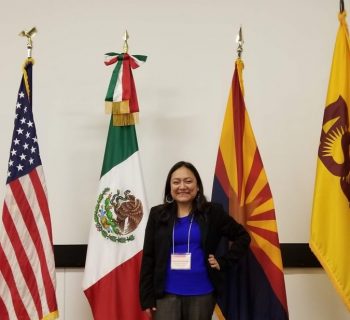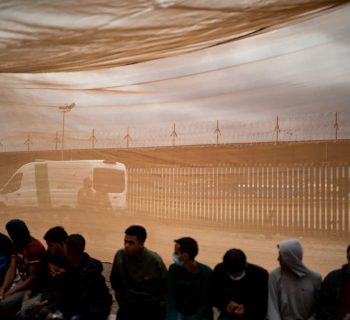By Alissa Torres ~ NY Times ~ April 27, 2018
A woman opens her heart to a relationship with a young immigrant from Colombia, despite the likelihood that it can’t last.
The departures by way of detention and deportation that I see on the news, wrenching scenes of love being pulled apart, hit a delicate spot in me and make me ache. My heart once housed similar fears of separation.
He and I first smiled at each other one night almost 20 years ago in Café Remy, a favorite downtown Manhattan spot for the area’s financial workers. With the humid August air making his dark thick hair a cherubic mess, I thought, “Hey, Angel Boy, you look so cute. Where did you get that crazy hair?”
I was feeling happy and bold because I was finally free from my previous boyfriend, who had broken up with me but kept me tethered with claims of “I love you” and “I miss you” and “I just need time.” He failed to mention that he needed time to pursue someone else. I spent the next few months rolling around on my floor, drinking wine and crying into my journals.
But in his absence, I started to understand how stifled I had been with someone who was happiest staying at home with his computer and television shows. In social situations with my friends, he always seemed adorably awkward, until the day he said, “I’m not shy. I just don’t want to expend my energy on them.”
Did I really want my ex to return to me? No. I wanted to go out and dance.
Again the wavy-haired man and I exchanged looks.
Then there were shouts in Spanish: “Let’s go dance!” And everyone went up the staircase to the second floor, where there was another bar and a small dance floor.
When the man looked at me for the third time, he did so with a subtle hand wave, beckoning me to the dance floor. So I went.
His name was Eddie. He was the only man in the place with a book of literature tucked under his arm. A currency broker from Cali, Colombia, he spent his days with three phones to his ears, making multi-million-dollar trades between banks in the United States and Latin America.
I assumed he had landed his coveted job as a member of a well-to-do family after studying at a prestigious American college and business school. Later, I would learn otherwise.
We danced until we needed a break and sat with our legs casually entwined, telling each other funny stories. At the end of the night, when we reached the club’s threshold, the moon hung bright next to the twin towers and the city air had become cool and breezy.
With his hand across my back, we walked and talked and kissed. When I waved goodbye from the taxi, the driver said, “You will see him again.”
I did see him the following week, but only to say goodbye. He wanted to tell me in person that he was in an unhappy relationship with the mother of his two sons. And even though that relationship was ending, his return to Colombia was imminent.
In one stressed-out ramble, he said, “My work permit expired and they’re not going to renew it, and now, with my job, they told me don’t bother coming back if I don’t fix this by next week.”
Nearly a decade before, he had arrived in New York via Mexico City, having crossed the Rio Grande into El Paso — a young man looking for a better life. He had worked poorly paid immigrant jobs: long days in sweatshops followed by late nights in catering halls. Then, through a friend, he lucked into a better-paying Wall Street job where, because he was bilingual, he was desperately needed to service Latin America’s emerging foreign exchange market.
There, with only a high school education, he calculated Uruguayan, Chilean and Colombian currency into dollars, sometimes simultaneously juggling all three in his head. He told me that most brokers handled no more than two.
Eddie had received his United States work permit after marrying a citizen, but when it came time for their green-card interview, his wife (not the mother of his boys) refused to go and divorced him soon after. As such, there was no reason for the United States Immigration and Naturalization Service to renew his work permit. For Eddie to apply for it himself would mean presenting himself to I.N.S. and risking everything.
On a warm September day, I accompanied him to 26 Federal Plaza in Lower Manhattan as his friend and witness, able to alert his family when his American dream devolved into a nightmare. I carried a leather briefcase and wore a couture military-style suit, balancing a professional look with a low-key sexiness for this man who I wanted to still lust after me no matter what happened next.
I.N.S. was in an ugly slab of a building within a huge concrete courtyard. It’s still there in all of its ugliness, but now it’s called the United States Citizenship and Immigration Service and its plaza is filled with security officers and their apparatus. What had been a public space to prepare for or decompress from the drama within has become part of the entrance gantlet.
I hoped I looked like Eddie’s immigration lawyer. In fact, I was a lawyer, albeit a nonpracticing one, with scant experience in immigration law. My only knowledge came from a semester-long internship that I spent fielding calls on an immigrant assistance hotline. During my shifts the phone rang continually, and I listened to one sad story after another. Rarely did I have any information that would lead to a happy ending.
Inside I.N.S. was a waiting room full of people, languages and unease. We checked in at a window, pushing papers through a small slot to an agent. There were many agents behind this glass, giving or receiving documents and telling people to sit and wait in the bolted-down plastic chairs.
Eventually an agent called for Eddie. As we approached, I stared hard at the agent, as if to say: “I see you. I’m watching everything.”
After Eddie went off, I sat alone. Since I was pretending to look like his lawyer, I didn’t kiss him goodbye. I felt sad I would never kiss him again. Now I would just be a link to his family, someone to deliver the bad news.
“Sorry, they took him,” I would say. “He wanted me to let you know.” Maybe I would meet his sons. As I waited, my mind kept churning out “What if?” scenarios, all kinds of terrible possibilities, until I ambushed myself with one that felt impossibly sweet: “What if he asked me to go with him, to Colombia or someplace else? What would I do?”
A small yet decisive voice inside me said yes. If he asked, I would go anywhere if it meant we could be together.
This was love, I realized. Love forged by the urgency of his situation, perhaps, but love nonetheless. It felt so awful and absurd for me to discover it under these circumstances, though, because it would never happen.
Then Eddie returned, overwhelming my circuitry by sidling up to me. I felt his body skim mine, and we looked at each other. His face was expressionless. We walked in silence until we were outside. “They just gave me this,” he finally said, revealing his new employment authorization card, cupped inside his palm as if he had just performed a magic trick.
It wasn’t a magic trick but a bureaucratic mess.
We wouldn’t know the truth for two years, after we married, when, during our own green-card interview, we were told that Eddie’s file had been lost back then. So when he had requested his work reauthorization on that warm September day, they didn’t know about his divorce and its implications for his immigration status. They had simply stamped his papers and then sent him on his way.
Now they were sending us on our way with Eddie’s status in limbo until they found his file.
Ten months later, in December 2001, I finally received Eddie’s green card in the mail while holding our month-old son in my arms. Eddie wasn’t there to receive it. He had died on Sept. 11, his second day at work as a senior broker at Cantor Fitzgerald.
That was nearly 17 years ago. Our son is now a young man. My separation from Eddie is permanent and unbreachable.
Meanwhile, I bear witness to the daily ruptures, the breaking of loving bonds between husbands and wives, parents and children, sisters and brothers. I see their pictures and watch their final embraces (if they are even allowed to have them). All of this love denied by a system and political view that turns what should be so easy and possible into something so cruel and impossible.
Source: Alissa Torres ~ NY Times





